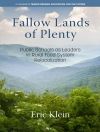Tabloid headlines such as ‘Anti-social Feral Youth, ’ ‘Vile Products of Welfare in the UK’ and ‘One in Four Adolescents is a Criminal’ have in recent years obscured understanding of what social justice means for young people and how they experience it. Youth marginality in Britain offers a new perspective by promoting young people’s voices and understanding the agency behind their actions. It explores different forms of social marginalisation within media, culture and society, focusing on how young people experience social discrimination at a personal and collective level.
This collection from a wide range of expert contributors showcases contemporary research on multiple youth deprivation of personal isolation, social hardship, gender and ethnic discrimination and social stigma. With a foreword from Robert Mac Donald, it explores the intersection of race, gender, class, asylum seeker status and care leavers in Britain, placing them in the broader context of austerity, poverty and inequality to highlight both change and continuity within young people’s social and cultural identities.
This timely contribution to debates concerning youth austerity in Britain is suitable for students across youth studies, sociology, education, criminology, youth work and social policy.
Spis treści
Foreword by Robert Mac Donald;
Part One: Youth Policy, Pariahs and Poverty:
Critically Theorising Young Adult Marginality: historical and contemporary perspectives ~ Shane Blackman and Ruth Rogers;
Broken Society, Anti-social contracts, Failing State? Rethinking Youth Marginality ~ Peter Squires;
Youth poverty and social exclusion in the UK ~ Eldin Fahmy;
Routine sanctions, humiliation and human struggle: qualitative biographies of young people’s experience of live marginality ~ Linda Brooks;
Normalisation of Youth Austerity Through Entertainment: critically addressing media representations of youth marginality in Britain ~ Shane Blackman and Ruth Rogers;
Part two: Intersections of Youth Marginality: class, gender, ethnicity and education;
Pramface Girls? Early motherhood, marginalisation and the management of stigma ~ Mary Jane Kehily;
Leisure lives on the margins: (Re)Imagining youth in Glasgow East End ~ Batchelor, S., Whittaker, L., Fraser, A. and Ling, L.;
Asylum Rejected: “Appeals rights exhausted” care leavers facing return and marginality ~ Kim Robinson and Lucy Williams;
Responses to the marginalisation of Roma young people in education ~ Jenny van Krieken Robson;
Apprentice or Student as alternatives to marginalisation ~ Patrick Ainley;
A School for our Community: critically assessing discourses of marginality in the establishment of a Free School ~ Claire Tupling;
The Marginalisation of Care: Young Care Leavers’ Experiences of Professional Relationships ~ Emma Davidson and Lisa Whittaker;
Part Three: Resistance and Ethnography;
[B]othered Youth: Stop and search, marginalisation and the policing of belonging ~ Seán F. Murphy;
On the Margins: the last place to rebel? Understanding young people’s resistance to social conformity ~ Jane Mc Kay and Frances Atherton;
‘Binge’ drinking devils and moral marginality: young people’s calculated hedonism in the Canterbury night-time economy ~ Robert Mc Pherson;
The New Spectral Army: Biography and youth poverty on Teesside’s deprived estates ~ Anthony Ruddy;
Conclusions: Advanced Youth Marginality Post Brexit ~ Ruth Rogers and Shane Blackman.
O autorze
Ruth Rogers is a Reader in Social Justice and Inclusion at Canterbury Christ Church University. She has led a large number of research projects working with deprived communities, looked after children and young offenders. She has also conducted research for a range of research councils, voluntary agencies, local authorities and central government. She is interested in research investigating youth and communities on the 'margins’, particularly in relation to looked after children, informal support networks and educational disadvantage.












